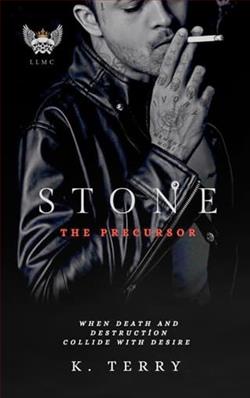Page 18 of Play Our Song
“Of course,” the old woman said. She fumbled for a purse and brought out her pension book. “Here, it says on there.”
“Right,” Tilly said, seeing that there was a phone number there. “You just sit here and I’ll get you a cup of tea and then I’ll look after all of this, alright?”
The woman nodded.
“Tea’s already served,” Max said, appearing with a cup of tea in his hand.
The woman took it gratefully.
Ten minutes later and the woman’s son had arrived to take her home and Tilly was handing back her pension book.
“I’m so sorry about all of this,” the son said.
“Don’t be,” said Tilly. “It’s what we’re here for. I’m just glad everything’s alright.” She closed the door behind the two of them and turned back to see Max staring at her thoughtfully. “You wanted to speak to me?”
“Come and sit down. We might actually get to drink our own tea this time.” He handed her a mug and settled into his chair. “What you just did there, it was kind,” he said. “It was good policing.”
“It was nothing,” said Tilly.
“No, it was something. Especially for Mrs. Dodds.”
Tilly said nothing to this.
Max rubbed his nose. “See, policing, in the end, it’s not about catching criminals and the likes. It’s not about beating the bad guy. It’s about people.”
“I understand that,” Tilly said. “The code of ethics specifies public service, specifically: ‘working in the public interest, fostering public trust and confidence, and taking pride in providing an excellent service to the public.’”
“Right,” Max said with yet another sigh. “It’s just that, well, you’ve only been here a little while, but I’m a bit concerned that perhaps quotas and regulations might be getting in the way of the whole people angle a little bit.”
“What do you mean?” Tilly asked.
“Like giving young Jamie a ticket for his bike. You could have given him a talking to and sent him off home. He didn’t need aticket. Or ticketing Ad Park’s car. She was just unloading a box of books in front of her own building.”
“So you’re suggesting that I stretch the law to allow people to do things they shouldn’t be doing,” Tilly said sharply.
“No,” said Max. He sounded quite firm about this. “I’m suggesting that perhaps you think about the human angle of things.” He rubbed his nose again. “After you’ve been an officer for a while, you start to realize that the law is a flexible thing, whether you like it or not.”
“I don’t like it,” Tilly said.
“And yet part of being a good officer is knowing when to let things go, knowing when to turn a blind eye, knowing when you’d be doing more harm than good by sticking to the letter of the law.”
“I disagree,” said Tilly.
Max nodded. “Alright, that’s your prerogative. I just wanted to mention it.”
Tilly nodded, took a deep breath and remembered that she was speaking to a superior. “Thank you.”
“Don’t mention it,” Max said. “Now, drink up. We’ve got places to be.”
“We do?”
He nodded. “Another stolen car, I’m afraid.”
“Another?”
Max put down his coffee cup. “There’s been a spate of them recently. This is the fifth one that I know of, though they’re not always being reported, I think. Mostly because they’re not luxury vehicles.”
“What does that mean?”















